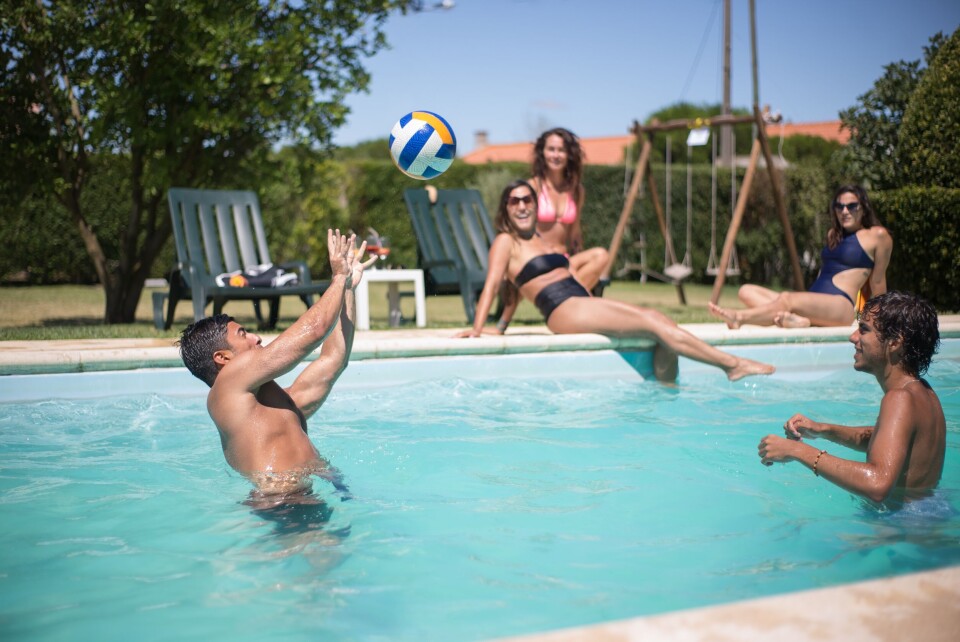-
Many Société Générale customers to be charged additional fees from April
There is some good news for international banking and instant transfers, however
-
Why gas prices in France are rising in April - and by how much
It comes after six consecutive monthly rises. Try these tips to reduce your bills
-
New notaire data suggests easing of Paris property crisis
Property experts have talked of ‘easing pressure’ and ‘breathing space’ after a four-year slump
Swimming pool ‘squatter’ incidents on the rise in southern France
Police are receiving more and more calls about people using pools without permission but often their power to act is limited

Incidents involving people breaking into private gardens or public facilities and using swimming pools without permission appear to be growing, especially in copropriétés in the south of France.
This trend of swimming pool ‘squatting’ caught one couple in Villeneuve-lez-Avignon (Gard) by surprise when they returned home one night to find a young couple in their pool, Le Figaro reports.
The public swimming pool in Saint-Lys, in the south west of Toulouse (Haute-Garonne), was also recently broken into by a group of young people.
“The squatters come in the evening when we have left. Neighbours call the police, who often arrive too late. Sometimes, [the squatters] leave all sorts of rubbish,” said a salesperson at swimming pool business Piscines Détente, near Clermont-Ferrand.
“But what can be done? These are display pools for our customers; we can’t leave them empty or dirty! And if we put a cover over them, it could be damaged. We are also not going to watch over them all night with a gun,”
Allô Toulouse, a platform through which residents can report all sorts of disturbances, has received 200 complaints about pool ‘squatting’ over the past three months.
“Last year, we were at 180 [complaints] for the same period,” the service stated.
“When an intrusion occurs, the police are contacted so that they can intervene as soon as possible,” said the mairie. “But in copropriétés, responsibilities linked to security fall to the owners and the syndic first. They must create effective measures, principally in terms of controlling access to shared spaces.”
The Guide-piscine.fr website, which offers advice to people hoping to install a pool, said that there are “10 to 15 calls to police each day in the summer concerning swimming pool squatting, especially in the south of France.
“When residents realise that their pool is being used, their first reflex is to call the police. But the authorities’ power is essentially quite limited.”
The law states that authorities may only intervene when individuals are “hindering the residents’ access and movement,” “preventing security systems from working properly” or “disturbing the peace of the environs”, and only the first two are punishable offences.
In addition, in pools belonging to copropriétés, the squatters can easily claim that they have been invited to use the facilities by another resident.
At times, swimming pool ‘squatting’ can result in violent confrontations. In Villeneuve-lez-Avignon, the couple using the pool drew a knife on the property owners when they arrived, and police later found possessions from the house in their car, including bottles of champagne.
What can I do about a swimming pool squatter?
If you realise that someone is using your pool or your copropriété’s pool without permission, the legal considerations mentioned above mean that the police will not always come out to the scene if you call them.
However, they will definitely come in the case of a ‘home invasion’ (violation de domicile), so if the squatters have caused any damage or are clearly trespassing, the police should be able to help.
If violation de domicile is confirmed, the squatters risk a €15,000 fine and up to a year in prison.
There are also several methods you can use to prevent people from using your swimming pool without your consent.
These include attaching an alarm to the pool and installing a cover which can be locked shut.
If you live in a copropriété, your syndic could decide to employ a pool guard, or perhaps a system through which each resident is given a bracelet with the number of their apartment, and can only use the pool if they wear it.
Swimming pools growing increasingly popular in France
There are more than three million private swimming pools in France, making it the second biggest market in the world behind the US.
In 2021, the number of pools being constructed rose by 30%.
Read more: Rent-a-pool: grain containers inspired French mobile pool business
The departments in which swimming pools are most common are Var and Vaucluse, where 15% of properties come with a pool set into the ground.
However, the garden features are also becoming more popular in the northern half of the country.
“Today, in contrast to what you might think, we build more swimming pools in the centre of France than in the south. The trend has really been reversed,” Jean-Louis Desjoyaux of Piscines Desjoyaux told Franceinfo.
The public desire for a private pool has been fuelled by the Covid lockdowns and by the hotter summers brought by climate change.
However, while these facilities help humans to cope with the effects of global warming, they do not help to prevent its progression.
A 20m2 pool heated by a pump creates 250kg of CO2 each year, the same as a return flight between Paris and Marseille.
The rise in the number of private pools also adds strain to water resources, increasing a household’s consumption by 10-15%.
Related articles
‘I get €3,000 a year’: Heatwave sees spike in garden rentals in France
How much value will a swimming pool add to my French house?
























